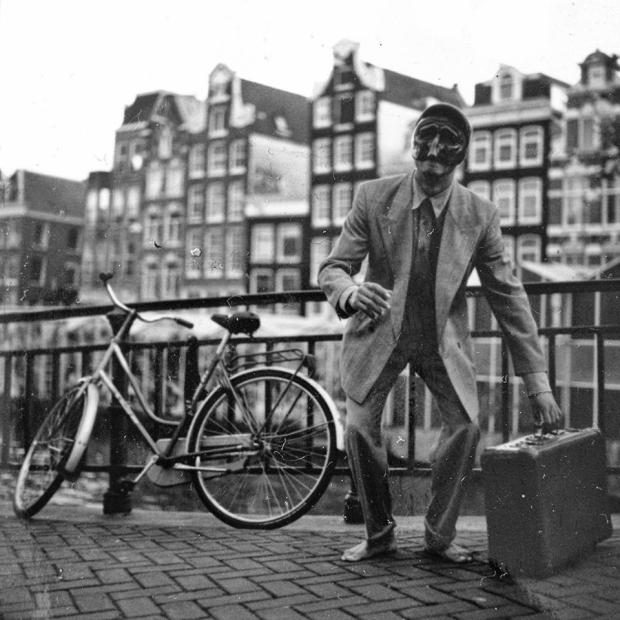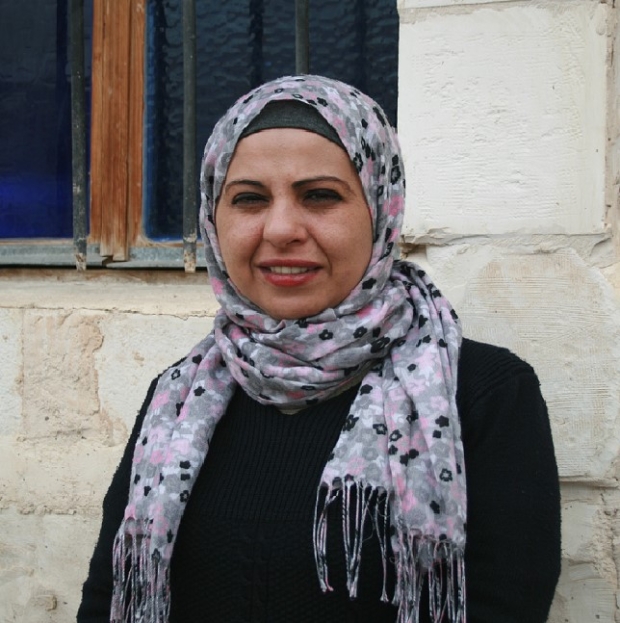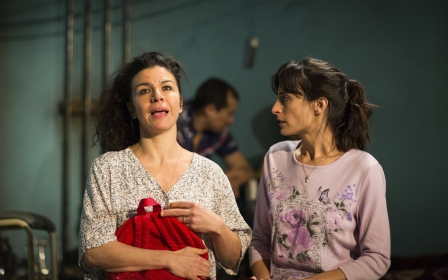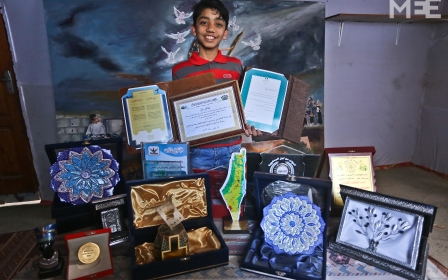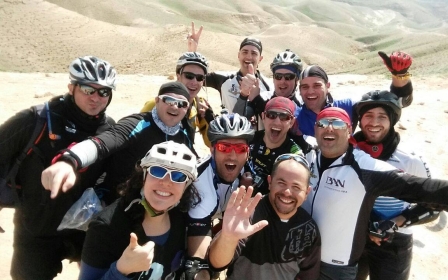Rewriting the script: Behind the scenes at the Jenin Freedom Theatre
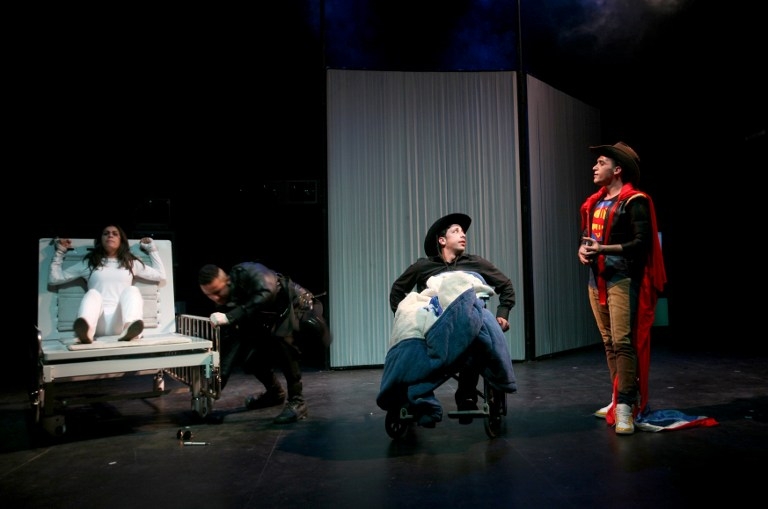
JENIN, West Bank - Last week I met Saber Shreim in Delicate, a French-style cafe in the Palestinian city of Jenin. Dressed in jeans and a t-shirt, a broad smile on his face, the 23-year-old actor jokingly refers to the chic coffee shop as his office.
It’s easy to picture him on stage. Tall and charismatic, Shreim is one of a handful of successful actors from the Israeli-occupied West Bank. Three months ago he landed a part in Arab Idol, a forthcoming film by Hany Abu Assad (director of the Oscar-nominated Omar) that tells the story of 25-year-old Palestinian pop sensation Mohammed Assaf. (Shreim plays Assaf’s best friend, Asmar.)
Sipping a coffee, a cigarette in his hand, Shreim talks about the pop singer’s rise to fame - a childhood spent in a refugee camp in Gaza, the trials of attending the Arab Idol auditions in Cairo (Assaf was stranded at the Egyptian border for two days and later jumped a fence to gain access to the hotel where the auditions were being held). Assaf fell to his knees on stage when he won Arab Idol last year. Shreim said he wept when he got the part in the film.
Life wasn’t always this way. In 2002, when Shreim was ten years old, the Israeli army launched a bloody offensive on Jenin refugee camp, a crowded encampment that is less than a square mile and home to 13,000 people. Shreim’s father, a baker, was shot in the leg and later bled to death in front of him and his mother.
The trauma of his father’s death left Shreim wavering between hopelessness and rebellion. He grew up suspicious of authority. After dropping out of school he penned raps about life under Israeli occupation, women’s rights and the "lost generation of Jenin", later forming a 13-piece band called Free Music.
At the band’s first gig in Jenin, Shreim met a member of the Jenin Freedom Theatre, a community-based theatre and film school which aims to generate “cultural resistance” through art and popular culture. After three years learning how to sing and dance, Shreim landed a lead role in Suicide Note from Palestine, a play about a Palestinian girl’s nightmare which took him across Europe.
Despite its troubled history, including the assassination of its founder Juliano Mer-Khamis by an unknown gunman in the refugee camp in 2011, the theatre has thrived, providing a safe space for aspiring actors to develop their talent and reflect on themselves and their communities.
“We are fighting for an alternative,” says Jonatan Stanczak, a Swedish activist and nurse who helped found the theatre in 2006. Asked what that alternative would look like, he replies: “A society that is just, equal and built on fundamental human rights. A place where human beings can be the best they can be.”
Stanczak, a father of two in his mid-thirties, believes that Palestinians are ruled by four occupiers: Israel, the Palestinian Authority, as well as banks and foreign aid. He claims a capitalist society has been created, pacifying people with consumerism. Palestinians also suffer from a form of "internal occupation", he says, where the language and narrative of their oppressors is internalised, leading to a kind of self-imprisonment that breeds destructive relationships and domestic violence.
Shreim looks out of the cafe window at a busy street in the city centre where young boys are selling fruit and vegetables out of the back of horse-drawn carts. “They are breadwinners,” he says. “Their parents were either killed in the conflict or are out of work.”
After ordering more coffee our conversation turns to the generations of Palestinian fighters in Jenin, “freedom fighters” as Shreim calls them. Most, he says, are men from poor families in the camp who have grown up poor.
“Nobody wants to be bad but people are stuck in a circle. If all the time you are being a victim you don’t change anything. Israel want us to be stupid, to do nothing with our lives ... They give us just enough not to die.”
Shreim pauses for thought.
“The question is how to get out of the circle. My generation have started to stand up to their families. People are doing cinema, theatre and music.”
Like Shreim, 26-year-old graphic designer Mohammed Dasuqi was born in Jenin refugee camp and has been involved in the Freedom Theatre since he was three. He was a teenager when the Israeli army entered the camp in 2002.
"We knew this was huge and something big was happening when we saw the tanks. I remember seeing people putting boxes and cables everywhere, booby traps set for soldiers. 21 of us stayed in a room for nine days, a safety room. The first two days were the hardest; all you could hear was bombing and shooting. When it was over, we had no windows or doors left.’’
Dasuqi said his life is been guided by an Arabic expression: “We will never live like we did before.”
On the wall of the Jenin Cinema guesthouse a handwritten sign addressing visitors reads:
"It is not allowed to drink alcohol. Women should not smoke outside the guesthouse. Women should not wear short trousers, skirts or tops. Men should not wear short trousers. No kissing, hugging."
When I asked him about this, Dasuqi acknowledged that challenging tradition, “gently prizing open minds” as he calls it, while maintaining respect for local custom can be difficult. He praises some traditional aspects of his Islamic culture, such as the intimate bonds between families and neighbours, often seen as missing in the West.
“Some of it is stupid, my father got it from his father and he got it from his. Societal norms like ‘acting is Haram (forbidden)’ pushes people away from the cultural movement,” he said. “Hundreds of years of traditions can’t be undone quickly.”
While in some cases, girls and boys have been prevented by their families from acting in films in Jenin, they are often allowed to be on the other side of the camera. Families who have attended performances say it challenged their understanding of “Western-style” theatre.
Women in theatre
Wearing jeans, lipstick and a patterned hijab, and talking immaculate English, Ruwand Arqawi, a project co-ordinator at the Cinema Jenin, stands out from the crowd.
When I ask Arqawi about the role of women in film and theatre in Jenin and the misgivings people had about the theatre in its early days, she says: “People were still bleeding from the 2002 invasion. It just wasn’t accepted for girls to come and see plays.”
Since then Arqawi has worked with the community, visiting families and building trust in the hope that one day everyone in Jenin will have relatives involved in the arts.
She tells me about the 2011 production of Alice in Wonderland at the Freedom Theatre which had a strong female lead and played to a full house. “I remember one woman who saw the play, she was so shocked she said: 'We are not in Jenin!'"
Arqawi's dream is to make a film on domestic violence.
In 2014, as part of a series of 10 films made by youth in Palestine, a fiction short on "honour" killings was screened at the cinema to 300 viewers.
An often secretive and controversial topic, both Arqawi and Dasuqi say that people were pleased the issue was raised. They said that while many know "honour" killing is wrong, seeing it on the big screen made them realise the devastation caused.
Mohammed said: “There was sadness that it’s still happening in some communities but the first step in talking about it has begun, and will continue.”
Middle East Eye propose une couverture et une analyse indépendantes et incomparables du Moyen-Orient, de l’Afrique du Nord et d’autres régions du monde. Pour en savoir plus sur la reprise de ce contenu et les frais qui s’appliquent, veuillez remplir ce formulaire [en anglais]. Pour en savoir plus sur MEE, cliquez ici [en anglais].


